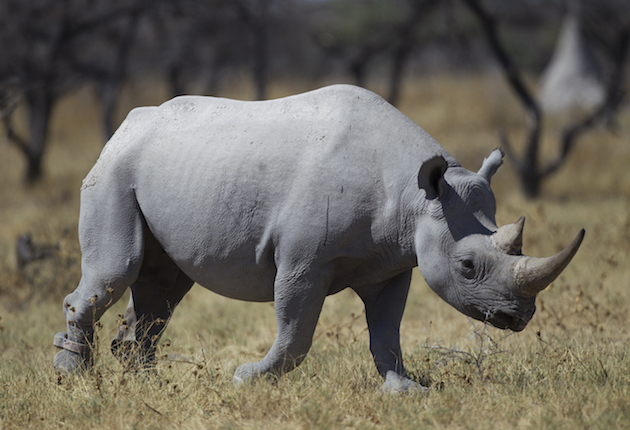Namibia’s plan to promote hunting within its borders is off to a Big Five start. Three black rhinoceros tags will be auctioned this year to benefit the species. Officials have already said they will reject global calls for the banning of rhino hunting to prevent the loss of revenue for local conservation initiatives.
The three tags will allow for one black rhino bull apiece. Namibia’s Ministry of Environment and Tourism began advertising the hunts earlier this month, with tags available to hunting companies registered with the Namibian Tourism Board. Special 20 percent discounts will be given to companies that are at least 20 percent owned by “previously disadvantaged” Namibians, SABC News quoted a government advertisement as saying. Companies owned by previously disadvantaged Namibians who have attained the rank of Professional Hunter will receive a 10 percent discount.
SABC News said companies could partner with foreign clients, provided the clients are registered with Namibian operators.
Those companies interested in bidding have until 1 p.m. June 30 to do so. The hunting season began in February and will run through November 30.
Black rhino bulls average 1,800 to 3,100 pounds, with an exceptionally large bull topping out at more than 6,000. A bull has two horns on its nose, with the larger front horn measuring an average of 20 inches. The largest black rhino horn known to science was measured at a whopping 4.9 feet, or 58.8 inches.
Native to east and southern Africa, the black rhino features a hooked upper lip, as opposed to the wide, squared upper lip of the white rhino.
Namibia has offered rhino hunts every year since 2012. An auctioned hunt in 2015 was purchased by American Cory Knowlton, raising $350,000 for rhino conservation … and igniting a firestorm of public backlash over the hunt. Despite the stated use of the money to benefit rhinos, the taking of a bull past its breeding age — an animal that was aggressive toward other members of its dwindling species — and the presence of government officials to make sure the hunt was above board, Knowlton received countless death threats from anti-hunters and so-called environmentalists.
“As a country we have our own legislation and we are not doing anything contrary to any law,” Environment minister Romeo Muyunda told ABC News. “As a matter of fact, our constitution allows us to empower our own people.
“We are hoping to get enough money from this auction but we also do not want it to be controversial like in the past.”
Perhaps the 2016 hunt, with equally admirable goals as the 2015 one, will go much easier for the participating hunters and the Namibian government.


As usual those opposed to hunting but not to threatening death to hunters fail to grasp the obvious. Nature is not filled with the happy animal families portrayed in children’s fairy tales. Bulls beyond breeding age interfere with propagation and therefore preservation of the species. One dead of natural causes or poaching is only carrion and therefore valueless. One taken via fair chase hunting “lives” for years in a collection or museum and the revenue it generates supports both the human and animal population while simultaneously denying a poacher ill gotten gain.